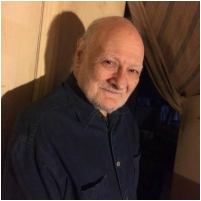 Stanley Kaplan has published poetry in a number of journals, including Onthebus, Midstream, Chiron Review, Ragazine, Mobius and Quiet Courage with others forthcoming. He lives in New York City where he paints as well as writes. He is the recipient of a Pollack- Krasner Foundation grant. His paintings can be seen on their web site, pkf.org. PRAM TO PRANK A big ado admonish. Confess you threw the confetti. You, a trobriander trudged to school. Scout, scramble, forget everything, because your potluck life ran from pram to prank. Your opera is opaque. QUINTET IN QUARTER NOTES Good and Plenty consecrated her quintet in quarter notes. The atonality quibbled with every quick shift while she shunted two parts together. Drinking port, she shoveled note upon note. Shrapnel sounds, musical tidbits discharged into the air, stunned and clattered.The harmonious clink clenched and called us home.
0 Comments
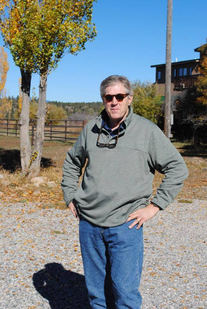 D.G. Geis divides his time between Houston and the Hill Country of Central Texas. He has an undergraduate degree in English Literature from the University of Houston and a graduate degree in philosophy from California State University. His poetry has appeared in 491 Magazine, Lost Coast, Blue Bonnet Review,The Broadkill Review, A Quiet Courage, SoftBlow International Poetry Journal, Blinders, Burningword Literary Journal, Poetry Scotland (Open Mouse), and Crosswinds, He will be featured in a forthcoming Tupelo Press chapbook anthologizing 9 New Poets and is winner of Blue Bonnet Review's Fall 2015 Poetry Contest. Tips on how to choose clothing for the deceased. Something dark is best. Perhaps a Sunday suit or formal business attire. Something you might wear for a special occasion-- like interviewing for a new job. Your new position will require a certain panache. Stiff determination and a resolute smile should make a lasting impression on your new Employer. Later, as your suit empties and you fade slowly into the woodwork, it will come to you how deep life’s roots really run-- two of which are already knocking, discreetly, at your new front door. Puppet Show This Potemkin village barely stands. Even the slightest breeze shakes its walls. Look closely and you can see the seams Where the set designer joined them together. There are no actors or extras, only half-dressed Manikins beckoning from storefront windows like Whores in Amsterdam—and, of course, standing On the sidewalk, cash in hand, their customers. Behind the curtain, standing in the wings, is Pinocchio, Nose sharpened into a pencil, palms open, moving Now to center stage, eyes on the audience, back to his Maker, waiting for the first tug of the strings that will Very shortly Move his enormous painted mouth.  John Grey is an Australian poet, US resident. Recently published in New Plains Review, Perceptions and the anthology, No Achilles with work upcoming in Big Muddy Review, Gargoyle, Coal City Review and Nebo LITTLE JOHNNY'S GOT THE BLUES It's almost midnight. It's quiet out but for an oak branch that taps upon his bedroom window. From the small radio plugged to his ear, a disc jockey, three states away, spins old southern blues records, rough and raw, whiskey-stained, aural wizardry to a white kid in the upper Midwest. His father's playing poker with his buddies. His mother's drunk on the couch. Theirs is a strung out kind of blues. Not three chords and a growl. More red faces and raised voices. Mississippi John Hurt is wailing "Spike Driver Blues." In the pain of that leather throat, a railroad's being built on the backs of poor black men. That sounds nothing like the ache from a belt across the legs... until, by the second verse, it does. BEAR COUNTRY Nightfall, I'm back from a jaunt through the land of the grizzly. Behind me, woods have turned black, mountains melted into sky. I made noise the whole way so the bears knew that I was coming. I saw one in the distance, drinking at a pond. I did not go in that direction. As much as I love nature, I'm aware that, being human bestows on me a mental superiority but not a physical one. Should one of those great creatures decide to take me on, what chance has acuity against rapacious claws, sharp teeth. I'm back at my den turn on all lights, report to the kitchen where with a cut of meat, a slice of bread, locked doors and windows, I'm returned temporarily to the top of the food chain. 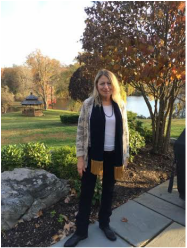 Thea Schiller, a Long Islander from New York, holds a B.A. in Creative Writing from The City University of New York, and an MS in counseling from Western Connecticut State University. For over two decades she spent her summers abroad in France with her late husband and daughter. She is the Orchard Prize winner for her poem, "Sarah" published in Furrow, University of Wisconsin, and has been published in other University literary presses. Currently, she lives in Westchester, practices psychotherapy in Connecticut and is writing her first novel. Eternal Snowfall Sartre said, There is “No Exit.” Two morning doves defy winter. The son turns East on the icy branch and prays. The mother bird puffs up her beige chest one last time; God’s flakes fall full and translucent. Crystal diamonds open up the promise of world Beyond isolation into memory. Hope expands past personal stores into Kingdom, Beyond Sartre and literature To find entrance.  James Croal Jackson lives in Columbus, Ohio. He spent a few years in Los Angeles working in the film industry, but now he releases electronic rap albums under the pseudonym 'Layzerus'. You can find some of his poems at jimjakk.com. Again For two weeks I bathed deep in the sweat of whiskey. Submerged vocals yawed to 3am caresses together, together. The silken bed turns itself over, its base an earthquake. Listerine breath hurls to vortex the two years of refraining from the holy riptide– how its arms reach and withdraw, reach and withdraw. You would drown in the salt of married shells, sheathe your crackled forearm in the tide's tattoo. You would let it embrace and clear your pearls. Thus begins the tide anew. The Photograph Was a Drunken Winter slackened falls into chaos: each plod a sobering imprint on snow buzzing cavernous hearts white honey swathes the air the dewdrop pale of her shirt, arms curved from the door in bent-seven candles, icicled waxen breath hissing this is the moment sculptured to ice: a future with gluey trees barren at night, tongues born licking telephone poles static moments stretched to angel hair feel like rare dreams caught in dim light Night Chill in the vacant living room our packed boxes never touched, black mold assumes the ceiling fan. it awakens every morning wanting to spin, to slice into the air with its fine blades a surgery of breathing and the chest waits for your steady palm to resuscitate those numb nights, when our billowed heat cooled our voluminous bits Arrival We were the hardwood floor. Cold squeaks, outstretched panther palm, red hand, expected the chlorine. Wax splashed baby oil eyes and it is citrus– cinnamon, acidic. Where we were wanted, the pitchfork path and jagged rim, this fungus crust metastasis, you twirl and twirl your index finger until it leaves. Pretzel we bend and fold to keep some memories alive we with our doughy cores– salty to the lick– rose and contracted, twisted into rope, into ebb and echo, ripples of the faintest caress, fingers forever indented on the crust Elizabeth S. Wolf lives in MA with her daughter and several pets, where she maintains a day job as a Technical Metadata Librarian. Elizabeth has previously published poems in local anthologies (Merrimac Mic: Gleanings from the First Year; 30 Poems in November 2014; Amherst Storybook Project). The Amherst Storybook Project is published in print and on YouTube: https://www.youtube.com/watch?v=z6d3pUd8jR0 Grateful for Good Neighbors for Tom and Marge Crosby Thank you, kind sir. You saw something not right- a child? a doll?- tossed awkwardly in a pile of leaves. But what’s important is this: you stopped. You went back. Out of your way, late for work, you listened to that little voice- something is not right- and you found a small girl. A toddler, naked and weary, burned and bruised- tortured- alone- in that pile of wet leaves. And you and your wife, you gathered that child up, in your arms, in your coat, and you brought that baby home. Thank you. In a crazy mad world we are told to look for the helpers. And you, you and your wife, on that morning, by that act, you saved a small girl, and also a shred of my soul. ** This poem was inspired by a local news story: http://www.boston.com/news/local/2015/11/23/the-parents-the-kidnapped-hamilton-girl-are-thanking-those-who-helped-find-her/7kwB5yeLKsL0fnEX2VC48N/story.html The Inside Scoop If I decide to tell you what I see, would you love me still? Trapped tumbling inside are my comrades from the madhouse: the woman who swore invisible poodles pooped on the rugs. She swore, in her pink tattered robe, ragged fringes framing her face; she stared from under chunks of eye liner, stale streaks of blue eye shadow, stared and saw poodles by the the country club pool, where her soon- to- be ex- husband and her ex- nanny lay stretched beside her children, the babies she had born, panting and pushing and crowning, children who feared her now, who lay safely outside, in the sun. Here in the hallways a skeleton is staring, drugged eyes sunk in bony sockets; he tried to starve himself, wasted away to nearly nothing; now he munches rye toast, walking slowly on skinny white legs, leaving a trail of dry crumbs; walks passed the jew who decided one night that he was the true jesus, who walked out barefoot through the snow, proclaiming his message and all that was divine; who was carried in raving and now sits rocking, rocking, rocking, cradling feet swathed in white bandages, covering blackened frostbitten skin, nearly lost toes; he believes the doctors from the ER drained all of his powers, all of his divine love; he seeks his debrided skin as if the shredded scales are holy, as if he could still be saved. Salvation. Lo I have seen the writing on the wall, heard the silent scream, lunched with the hollow men, the stuffed men. So will you, won’t you, will you, won’t you, come and join the dance? Just this morning I noticed the door was ajar. ** The opening line of this poem was inspired by "If I were to tell you what I see, would you love me still?" from: A Case Against Old Habits, Janet Longe Sadler, Amherst Writers and Artists Press Sorrowing Back and forth, back and forth. Oh how I love to go up in a swing, up in the sky so blue. Three years old, three years old. Yesterday he was laughing laughing laughing at the little dog with an upturned tail. Mummy we can see where he goes poopie! Back and forth, back and forth. Oh how I love to go up in a swing, up in the sky so blue. Mummy mummy mummy I can’t breathe. The wheeze, the cough, the wide terrified eyes, lips turning blue. Mummy mummy mummy where my medicine? Back and forth, back and forth. Oh how I love to go up in a swing, up in the sky so blue. To the park! His very favorite place. Over there we look for dandelions, we puff and blow off all the fluff. Here in summer, the sprinkler comes on. Look at me, mummy. Look at me! Look! There’s where he toddled at two, chasing bubbles, on stubby chubby legs. Here’s where he fell on his pampered butt, looking so surprised. Back and forth, back and forth. Oh how I love to go up in a swing, up in the sky so blue. Yesterday she looked everywhere, everywhere, couch cushions flying, bathroom cabinets flung open, drawers overturned. Where is the inhaler. Where is the epi pen. Mother of God, where is your Child: please let my baby breathe. Back and forth, back and forth. Oh how I love to go up in a swing, up in the sky so blue. She dressed him in his Blue’s Clues shirt. She dressed him in his red red shorts. She carried him down to his favorite park to the swing he used as a baby; the swing with a seatbelt to hold him in. Back and forth. She sang. She prayed. When the sun went down, she recited Goodnight Moon: In the great green room was a telephone, and a red balloon… Back and forth. He is not giggling. Back and forth. He is not pumping his sturdy legs; back and forth not tossing his shoes into the grass; back and forth he is not breathing back and forth Mummy’s best boy back and forth keeping in rhythm back and forth just the two of us back and forth up and down Mummy and son forever and ever, amen. Dawn came. The coffee truck opened for business. The police came. The neighbors watched from a few feet away. The baby left on a stretcher, the sheet pulled up over his head. The momma went in another car to a different place. Somewhere nobody ever wanted to go. Goodnight moon. Goodnight air. Goodnight noises everywhere. Goodnight baby. Mummy loves you now and forever, my little angel. Amen. ** Sorrowing was inspired by a story in the Washington Post in May 2015. The events in the poem are completely fictional; I have not followed the continuing story in the news. https://www.washingtonpost.com/local/mother-found-pushing-dead-three-year-old-on-a-swing-in-md-park/2015/05/22/b2acd6fe-00b6-11e5-805c-c3f407e5a9e9_story.html Germanwings 9525 24 March 2015 It was a mild mid- morning in March when the plane, after a short delay, took off from Barcelona. There were 56 empty seats; there were 144 passengers on board; there were 6 crew members. There were no survivors. There were 16 German high school students heading home that Tuesday. Sixteen lives on the cusp, aborted. The girl in row 16 sobbed, wished she had kissed that boy who stared at her, wished she had hugged her mother and not turned away, not refused to let her mother help pack and carry her bag. Iche liebe meine mutter, she says, over and over, her stomach in her ears, her ears throbbing, now she is screaming, I love my mother. The pilot knocks at the locked cockpit door. The copilot breathes steadily in silence. The baby in row 11 wails. His ears hurt, thinks the mama. She starts to shush and rock her child. The papa points out the window with a shaking hand. Look. Now the mama rocks and prays, singing the lullaby her mama sang to her: Sleep, baby, sleep. Sleep, baby, sleep. She calls on all of the angels of God to spare her only child. If this impossible thing is happening maybe a miracle is possible too. The businessman in seat 3A gives up doodling on his expense report and cries for the child that he won’t see grow up; for the wife he won’t kiss again; for ever leaving home for a stupid business trip. The businessman thanks God for life insurance, hopes that his wife never finds those pictures tucked up and zipped into his briefcase pocket: Please, God, spare her that. And mama, meine gelibte mutter, I love you. The pilot backs up, lunges at the unrelenting door. The copilot breathes steadily in silence. The retired grandma in row 22 closes her eyes thanks heaven for this last week with the children and their children, precious kindele; she wings a prayer to her best friend through all these last long years; remembers being fond of her husband, and prepares to meet him and her blessed mother when the plane plunges into the blanket of snow spread over the rugged mountains. The bass baritone in row 9, whose honeyed low notes resonated with dramatic emotion, is reduced to sobbing and calling out for Ave Maria, Mother of God. The pilot shouts orders and codes, thrashing at the door. The copilot breathes steadily in silence. The stewardesses hug each other. They know crash position won’t do a damn thing. They think of the hours spent trying to identify the enemy in the crowd while all along evil was standing beside them, in uniform. And this is how it will end. The high school boy in row 17 is sorry that insisting on sex ever made Annika cry; hopes his father remembers how proud he was when he made that basket at the buzzer, and when he stood up to those jerks at the park, even though the kid they were picking on really was a dork. The pilot steadies himself pictures his mother, young and tender and sleepy, tucking him back into bed. He apologizes for his hubris. The pilot, bellowing, tries to overthrow fate but he can’t. The baby in row 33 puts her hands to her ears and shrieks. Her mama screams too, counting her rosaries on baby’s flexed toes, begging forgiveness for minor forgettable sins. The copilot, breathing steadily in silence, disables all alarms overrides auto-corrections and recalibrates his deliberate descent. The American mother and daughter in row 27 clutch hands as the earth hurtles closer; the mother closes her eyes, refuses to believe; the daughter screams “What is happening?” over and over, as if translating into a different language could change the certain course. The unthinkable happens: the plane crashes in flames. For days the crews search at the Ravin de Rose´, melted snow refrozen around chunks of char and melted metal. They find scattered teeth and bones. They report headaches, some nausea, some shortness of breath. Possibly high altitude sickness; the plane hit the mountain at 5,000 feet. Possibly the sudden release of 150 souls returned to stardust and ash. At night the inspector from the local village goes home, scrubs away the grit and warms his hands; climbs into bed giving thanks for his home and family, for the mother who loved him and the father who raised him to be the kind of man who walks into the wreckage of hell and tries to mend it, or at least comprehend. He prays for a dreamless sleep, but awakens again and again to the phantom cries of the anguished pilot banging on the cockpit door. The reporter on the spot once so jaded and cynical always good for another round of drinks sets aside his cell phone ceasing to follow and retweet; turns off the TV with captions the radio with constant commentary, and closing his tired eyes, thinks back to the last time he told his mother he loved her; the last time he saluted his father, lost in old stories of a forgotten, predictable war. The reporter is haunted by the madness of the copilot breathing steadily, in silence, for the 10 long minutes he dove towards destruction. The restless reporter feels his lips moving in prayer for the eternal salvation of the pilot blocked by the locked cockpit door. ** This poem was inspired by the widely reported actual crash in March 2015. The occupations and ages of the passengers, type of plane, site of the crash, and actions of the pilot and copilot are taken from news stories or twitter. The thoughts of the passengers and crew are solely fiction.  Marie Kilroy has recently been published in Allegro Poetry Magazine, Loveliest Magazine and the Lummox Press. She graduated from the University of Mary Washington with a B.A. in English and lives in New York City. Desert Seeds “…things and animals – and our enjoyment of it is so indescribably beautiful and rich only because it is full of inherited memories of the engendering and birthing of millions. In one creative thought a thousand forgotten nights of love come to life again and fill it with majesty and exaltation.” – Rilke I lie flat against the flat Mexican plateau. The cacti’s silhouettes stand silently in the sunset like soldiers, arms raised skyward. In the early evening the stars flood in like girls in Quinceañera gowns, grasshopper salt on their shiny lips, and they float above on the sky’s dance floor as the volcano with its icy hat puffs his pipe to greet them. Rilke believed in a future poet who comes to say the ecstasies that are unsayable. I believe him and the owl uttering words I cannot repeat. The black witch moth’s seven inch wingspan sets in motion a fire on the coast. Small animal skeletons litter the sand like diamonds on a rich woman’s arm. We are all birthing all the time. I vow to love it all, even the solitude. I can see the seeds alight in the wind, birds to new births, the world over in majesty and exaltation. City Swan In the late evening in Central Park lies the edge of the lake-- glowing in the little light from the moon lies the swan, from song to silence and stuck in the little laps of water against earth, beak tucked in a U as if she was trying to un-see, to look around the still-rooted trees in their black gowns like willows at a funeral mystical, ethereal in gossamer nightshade the feathers still satin, the wings unfolded, leaving her round body exposed, her tiny feet in mud – O, mythological Swan; O regal Swan—felled, felled-- A homeless man laughs at the sight—“That’s what’s next!!” and pees into the grass, stance askance the vinegar smell, a fog smoking upwards in the branches-- her body hardening against the soft waves.  Robert Knox is a creative writer, a freelance journalist for the Boston Globe, a blogger on nature, books and other subjects, and a rabid gardener, who makes his home in Quincy, Massachusetts. A graduate of Yale (B.A.) and Boston University (M.A. in English literature), he is a former college teacher and newspaper editor, whose stories, poems, and creative nonfiction have appeared in numerous publications. His poems have recently appeared in Verse-Virtual, Guide to Kulchur Creative Journal, The Poetry Superhighway, Bombay Review, Earl of Plaid, Rain, Party & Disaster Society and Semaphore Journal. He serves as a contributing writer for Verse-Virtual, an online poetry journal. A collection of his poems, titled "Gardeners Do It With Their Hands Dirty," will be published this year by Coda Crab Books. The Alligator's Approach to the Birds It is not for everyone, this Paradise of Birds The wingless ones who stand beneath the shade-cover on the boardwalk pavilion are given leave to watch, a dozen brown and watery feet away, the color of old trees glimpsed in a window's reflections, bits of shell and water-eaten leafage at the base We'll get no closer The birds know how to measure distance -- and ability, we have no wings to fly -- They land on a dime, on a dollar-sized island We stand on ceremony, the gnawing anxiety of wet feet, as if water itself were toxic We are lingering glances and superannuated vigilance But eyes cannot hurt them We pose no threat to the Paradise of Birds Who brings the stork's babies? We question one another A head like the curve of an umbrella handle turned upside down, The wood stork is patterned silk on top, yards of plump white plumage below Its young both indescribable and hard to glimpse Not half-brown like the Anhinga, whose adolescents are caramel feathered and bear allegiance to a race of beige and mustard-colored snake people and live below the waters now in a world we cannot see We satisfy our craving for vision with the Paradise of Birds Birds, we know, are merely people in a different dress (though cannot the same be said of trees?) They too enjoy a fine March day in the face of a smiling sun, fish a-plenty (where we live no such days exist) They toy with the furniture inside their nests, adjust the framing, smooth the slipcovers, content to ignore the squawks of the babes demanding to be fed They are beyond such needs in weather like this -- pellucid, clear as glass, free of insects and parasites, holding wings high to dry in the sun like Washing Day in some earlier century (though without the elbow grease) all pleasure, no work They are nature's machines for turning air and water into the grace of flight that miracle of which we are always bereft, banned forever from the Paradise of Birds The herons, winged heroes, glitter-glide besides the humans, aging creatures who crave to worship in the glow of their beauty Who will fly only when they leave this heavier career behind one final time, seeking in immaterial flight some greater good (seeking entrance then to the Paradise of Birds) Who now fly only eyes closed, limbs inert in the phantasms of the liberated chambers of the brain, those rooms they cannot decorate or conform to will Who soar only in their minds, their mind's eye of stimulus and love Who gaze with longing, and wonder at the Paradise of Birds 2. Only one beast disturbs the Paradise of Birds It syncopates the water in brownish segments a disturbance in the watercolor as if old paint got up to walk It motors in silence, like appetite or time, or the silent renewal of solid earth beneath your feet Arrives like surprise Like thought made visible, an idea given shape Like Hegel's notion of history a submerged and troubled mass forming for revolt Yet though subtle as a reptile its metrics are known by those clear-eyed cousins roosting in the bare tops of the cypress trees, mere skeletal frames and furniture for the Paradise of Birds And when the stick-legged guardians of heaven, their rapiers in their faces, their light and parried weaponry tied snuggly to their brains espy the ancient enemy They hoot their worries, in airy segmentation, a ceaseless one-two-three, warning all of the creature's trespass, the reptile in the sally garden waters of the Paradise of Birds  Rick Hartwell is a retired middle school teacher (remember the hormonally-challenged?) living in Southern California. He believes in the succinct, that the small becomes large; and, like the Transcendentalists and William Blake, that the instant contains eternity. Given his “druthers,” if he’s not writing, Rick would rather still be tailing plywood in a mill in Oregon. He can be reached at[email protected]. Ecce Alieni Night shadows, day shadows, each of dissimilar nature; being used to day shadows, encountering friends, alter egos, constant companions of sunlit days; however, night shadows are strangers, soulless interlopers of dark. Traveling through the living room at two a.m., no lights, not wanting to disturb a sleeping family; encountering the alien behind the Japanese screen, three-legged, elongated head, square-jawed, I’m momentarily disarmed. Slow realization arises; new tripod telescope, moved yesterday to clean, but no less alien for all the dawning awareness; then stealing away with the scope into the backyard, before false dawn, pushing to meet my fears. Behold the alien worlds above! Judas Goat Despised, reviled, vilified, his infamy lingers in myth and village folklore used to shame the too young and too old as to the depths of their betrayals of others’ certain trust. But was it so? Was he set up? Or prophesy fulfilled? By some recounts he was a pawn used like some lamb or goat led to future slaughter almost as accounts in Old History books depict, but brought forth into the New Light’s redemptive history. But was it so? Was he set up? Or prophesy fulfilled? As the robber on the right-hand declaring belief, forgiveness might have been granted him to sit at an ethereal table with all others who followed the journey of distance and depth. But if that’s so it was setup and prophesy fulfilled – Then such an unearthly slab need be round, slighting none of those seated of plan or pardon who, obligated by mandate to do their part, are rewarded for their resolve and allegiance. But if that’s so, it was setup and prophesy fulfilled – Thus, he should be a guest at the Man’s table; exonerated for having no say in the matter curbed of his free will to act as he wanted, shunning payment other than to feast above. More than on a technicality, on a tree hangs his absolution. Synchronicity Jubilant robins’ chorus Spring rain’s tremolo 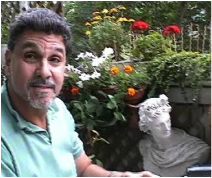 Gary Beck has spent most of his adult life as a theater director, and as an art dealer when he couldn’t make a living in theater. He has 11 published chapbooks. His poetry collections include: Days of Destruction (Skive Press), Expectations (Rogue Scholars Press). Dawn in Cities, Assault on Nature, Songs of a Clerk, Civilized Ways, Displays (Winter Goose Publishing). Perceptions, Fault Lines and Tremors will be published by Winter Goose Publishing. Conditioned Response (Nazar Look). Blossoms of Decay will be published by Nazar Look. Resonance will be published by Dreaming Big Press. His novels include: Extreme Change (Cogwheel Press) Acts of Defiance (Artema Press). Flawed Connections (Black Rose Writing). His short story collection, A Glimpse of Youth (Sweatshoppe Publications). His original plays and translations of Moliere, Aristophanes and Sophocles have been produced Off Broadway. His poetry, fiction and essays have appeared in hundreds of literary magazines. He currently lives in New York City. Unnatural Selection A giant storm is coming and people rush to prepare, hurrying to supermarkets, hardware stores, the sensible buying candles, batteries, water, dried food, thinking about survival. The stupid buy beer, drugs, candy, waiting to be entertained by a destructive force that no longer removes the unfit, mentally deficient, protected by big screen tvs. Choices It is better to strive for fragile happiness, especially when things go wrong and misery beckons, eager to encourage self-pity, withdrawal from the constant struggle that afflicts us daily in this demanding life that promises no tomorrows, except to the deluded who cannot conceive that their departure may be a moment away, decided abruptly by the coincidence of fate.  Charles Leggett is a professional actor based in Seattle, WA, USA. Recent publications include FRIGG Magazine, Graze, Latchkey Tales, Form Quarterly, Firewords (United Kingdom), Southword Journal (Munster Literature Centre, Cork City, Ireland), and Punchnel’s. Others include The Lyric and Measure: A Review of Formal Poetry; his long poem “Premature Tombeau for John Ashbery” is an e-chapbook in the Barnwood Press “Great Find” series. FOR THE STREETCAR NAMED DESIRE The latter two weeks of the run, First hour or so of Act One, I set these on a page As I sat on the stage-- I hope they will give you some fun! --Intiman Playhouse, Seattle, WA, USA, July 2008 1. Stella laid all her cards on the table. If the metaphor’s old, here’s a fable: Of a love and Love’s War, Of a child that she bore And a bed frame, it seems, that was stable. It is easily said of the Hubbles That they live in a world full of troubles. But their kiss-and-make-ups Leave them grinning like pups, And the plaster reduced to a rubble. One senses, of Neighbor Claudine, There’s little that she hasn’t seen. If I speak out of turn, Comes her hellish slow burn-- Here’s hoping you know what I mean. Poor old Pablo, he really can’t win: Exaltation expressed, or chagrin, At the best or worst hand In the tongue of his land-- Made to say it por inglés again! That strapping young news-rag collector, He kissed Stella’s sister—plumb wrecked her! As for him, well, we yearn At his age, then we learn. He’s sadder, more wise, and erecter. The whore with the dark ruby lips, Just watch how she tosses her hips: A card shark at poker Just holding her Joker And languidly tossing in chips. If you think that policeman is buff Then you don’t know him quite well enough: Doesn’t work out with Mitch, He just knows how to stitch Downy diamonds to fill out his rough.* Can’t help but say, speaking of Mitch, Can’t help but say ain’t life a bitch. And it helps that it rhymes In the way spire chimes Help gravediggers digging their ditch. New Orleans folk mourning your dead: That flower-girl, parse what she’s said! If she knows you don’t know How the language should go She’ll sell you dead flowers instead! There are things lying deep in that “purse” That is carried onstage by the Nurse That might make one unsure Of a word such as “cure”-- It begins in the same way as curse! As symbol, the Doctor brings Death; Asks nothing from one but one’s breath. His cold work, one may feel (Though his scythe be cold steel), Is this night not reckoned a theft. And there once was a lady named Blanche. Figure her as a bough, not a branch; And as blossom, not flower; Not a copse, but a bower; Under drifts—must we say avalanche? One said, “I am the glamorous type,” And then, “I am the glamorous type.” After Stan said, “So what?” His stubbed cigarette butt Went for compost, while Silence came ripe. 2. The streetcar named Desire Has a hot seat, don’t you know. It sizzles when it’s moving slow But, as with wind through fire, Consumes at faster speeds; The streets a grayish, smoky blur, Its riders’ speech ill-blent in slur. Exhilaration bleeds Upwards through the spine-- Which tolerates the jolts and shifts In gravity—then gravely lifts The spirits through a fine, User-friendly atlas- Catalogue, a River Bourbon Easing past Elysium. Pomade-primped and hatless In gusts of city air The mild conductor calls them out With his dry indifferent shout And blithely turns to stare At all the obvious Tourists, visitors and bums (He sees right through the locals), hums Something rather tuneless (Though mindful of the downbeat)-- As of what intoxicates, As of where we meet our fates-- That someone in the hot seat Can’t but hear and squirm A little there, as if, in dream: That far-off, nigglingly extreme And half-forgotten worm Of conscience sometimes found To be—when under scrutiny, And with uncertain irony-- Dream’s subject, crawls around An ever-nearing corner. A cat’s meow. A paper moon. The crack of gunfire. The sultry moan Of Adiós from a mourner. A honeysuckle rose Singing Della Robbia blues, Brown spindly fingers drawn to muse Along the pliant rows Of orchard white and sable. Perhaps a gull’s accusing shriek Awakens you. A blinding streak Of light—a gnashing cable Showering sparks, or else The sun, merely, the moon, merely, Any naked bulb—you’ve nearly Missed your stop! The shells On beaches of the ocean That you’ve contrived to die upon Will whisper of it when you’ve gone, This rattletrap emotion: We’ll press them home and listen, Our faces taut in expectation Of certain sounds, as its oblation Down our cheekbones glistens. * The author, who played the policeman, had shoulder pads inserted into his uniform.  Danny P. Barbare resides in the Southern U.S. He attended Greenville Technical College, where his poetry won The Jim Gitting's Award. And has also been nominated for Best of the Net by Assisi Online Journal. He likes to travel to The Blue Ridge Mountains especially Carl Sandburg's old home which is now run by the U.S. Forestry Department in Flat Rock, North Carolina. And he also loves to travel to the lowlands of Charleston, South Carolina. His poetry has appeared locally, nationally, and abroad as faraway as Japan. He has been published in Canada as well as thirty other countries over the past 34 years. Shopping with My Wife at Mall I’m green and red I’m square, round, and rectangular I’m a candle I’m Winter Candy Apple Merry Cookie, Jingle All the Way Vanilla Bean Noel I’m Hickory Farms, William Sonora Organic Tea I’m song, Calvin and Klein, children and Santa and Christmas trees I’m Macy’s, jewelry, and everything else all the way. Ideal Baseball Collage Painted Like an American Flag Well rounded like a baseball, America is stitched together fast to help friends and throw an assortment of pitches to enemies like a typical red, white and blue game, that yearns for homeruns as if they are painted in the shape of a flag.  John Grey is an Australian poet, US resident. Recently published in New Plains Review, Perceptions and the anthology, No Achilles with work upcoming in Big Muddy Review, Gargoyle, Coal City Review and Nebo. A CHILD SHORT-CHANGED ON BODIES OF WATER by John Grey It's nothing special, about as small in size as a bakery parking lot. And, to be honest, it's hardly a gem of sparkling waters, merely a blob of drowned weeds. It's as unremarkable as the kids I went to school with and yet, from that ordinary bunch, emerged my closest friends. No one ever wasted a moment fishing here. And it's certainly no swimming hole. The best you can do is dip your fingers, maybe disturb the muddy bottom a little. Or scoop up tadpoles for a brief life in ajar. Not even nostalgia can come to its aid. You'd think that, removed by years, it would grow in stature, purify, stock itself with trout. But it's been a struggle for time. And my memory has no wish to contradict their findings. Truth is, it was the only pond we had so we had to make the most of it. But it couldn't rise to the occasion. become a mighty river for warring tribes or the Pacific Ocean for our navy games. I envy those who grew up near real lakes, who could marvel at the circumference, the depths, without resorting to imagination. Yes, they do darkly color their reminiscing with tales of kids drowning. A small price to pay for all that coming up for air. LUNCH WITH KATE by John Grey
Kate leaves room beside her on a bench. The quick controlled sashay of her slim body across the seat, the squeezing of her arms tight to her sides, allows me to sit without our thighs quite touching. I still slide my way in tiny increments to make that microscopic gap between us, a statement in itself. Her perfume however is far from shy. It's in my nostrils, reeking femininity. Her conversation is sweet and circles topics like the kids playing catch on the distant greensward or hand-locked lovers drifting by us as they stroll the park trails. The fun, the seriousness, are like our bodies, putting up nervous barriers even as they will themselves to intertwine a little. It's a break from work and we eat our lunch together. Crumbs drop within easy reach of pigeons. Hints follow suit but without a beak to snare them. We are not in love but there's a definite liking there. Bread in teeth, water bottle at the ready, pants and dress separated by a thread, glances shared between face and meadow, not forgetting birds cooing around our shoes - on a warm midday in the park, this is what attraction has to work with.  Robert Knox is a creative writer, a freelance journalist for the Boston Globe, a blogger on nature, books and other subjects, and a rabid gardener, who makes his home in Quincy, Massachusetts. A graduate of Yale (B.A.) and Boston University (M.A. in English literature), he is a former college teacher and newspaper editor, whose stories, poems, and creative nonfiction have appeared in numerous publications. His poems have recently appeared in Verse-Virtual, Guide to Kulchur Creative Journal, The Poetry Superhighway, Bombay Review, Earl of Plaid, Rain, Party & Disaster Society and Semaphore Journal. He serves as a contributing writer for Verse-Virtual, an online poetry journal. A collection of his poems, titled "Gardeners Do It With Their Hands Dirty," will be published this year by Coda Crab Books THE REBEL ANGELS LOOK BACK by Robert Knox
So in the last days of winter, when the turn of the season will not come in the month that trumpets its arrival with leonine roar, strutting its changeable hour, full of sound and fury, because the poor earth below is still burdened with six-foot phalanxes of cold, slow-frozen dirty walls that once were exposed, in their modesty, as 'sidewalks,' when the soul finds no sweet release in jumping the time to come, the whole graduated journey, and so we launch tormented flesh straight to the days of eighty in the shade, sun-burnished sand beneath the toes, warm saltwater sluicing the limbs like the gurgling god of some peripatetic Neptune, green and endlessly inventive, palms being palms, swaying heavy-handed, lifted overhead in some unsolicited blessing, familiar flowers looking like July, creatures ordinarily clad stretched bare to the healing air .... Well, in brief, we'll take it, balm and anodyne, warm water, pleasant airs, fair breezes and from the look of things (neighbors smiling like cream-fed cats) nobody paying a dime for any of this Till, thunder-struck on a summer's day, time's fell hour slices down, our curtain falls and villain check-out time, that winter of the imagination, looms before us, we gather our share of remembrance to trundle northward, icy patches sloughing beneath the wings of the homebound jet And picturing once more, in the album of bittersweet remembrance those beatitudes with attitudes, the postures and sun-streamed smiles of those who recline as if forever on adjustable chairs in the rarefied greensleeves of heavenly breezes, balmy hours, occasional cloudiness, a few sprinkles just the other night dampening the towels and yesterday's pool wear, contemplating the body-poach of the hot tub later, supper on the balcony, how could we not feel (if only for an instant) like the disobedient angels casting last looks at paradise lost as they are driven cruelly to a very warm place which frankly -- at certain times, days of blizzards, blackouts, and broken trains -- does not sound too very terrible either  Frank Geurrandeno is a Roanoke College undergraduate studying Creative Writing. Early in his career, he has found success with poetry and short fiction in various print and online publications including Boston Literary Magazine, Dark Matter Journal, Sediments Literary-Arts Journal, Word Soup's "End Hunger" series, East Jasmine Review, and most recently in The Jawline Review. http://www.twitter.com/RC_FrankG "electric blue"
I am white canvas and you are electric blue the spark of my all "entity" a gasp of billows the cockcrow asks for my name brushing sandy coves "red" masked men stare behind the curtains on stained windows vermilion eye "Mock" Of magnificence, shrewd journeys to the godful mend witching hours. 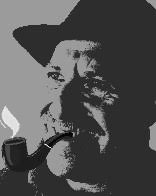 Mitchell Krockmalnik Grabois has had over a thousand of his poems and fictions appear in literary magazines in the U.S. and abroad. He has been nominated for the Pushcart Prize, The Best of the Net, and Queen’s Ferry Press’s Best Small Fictions for work published in 2011 through 2015. His novel, Two-Headed Dog, based on his work as a clinical psychologist in a state hospital, is available for Kindle and Nook, or as a print edition. He lives in Denver. Octopus by Mitchell Krockmalnik Grabois I am an octopus and evil Telepathic I inhabit the minds of men My motivation: I wrote a memoir but no one read it The ink ran The paper sogged I’m going to rewrite it and include the most recent events of my life and my most recent thoughts the most brilliant ones ever By rights, it should be a best seller but every agent tells me it’s either too literary, too crude, too sexual, too feminist too quirky or simply too octopoid for the mass market If I were a famous talk show host I could easily find representation but I’m an octopus living in a hole at the bottom of the ocean that’s like the worst public housing in the most terrible slum I flee from speedy predators like sea lions-- that’s one of the chapters in my book Sea lions lack subtlety They never suffer from depression Even when they’re thrown off an ice flow by a killer whale or two and their offspring are eaten they never get blue never suffer hate or thirst for vengeance-- that’s not the way they’re made They lack emotion My memoir is full of emotion It has depth I sometimes suffer depression and have many notes about how depression gets one in touch with one’s soul though if I had my choice I would forego depression entirely Word by Mitchell Krockmalnik Grabois In the beginning was the Word but what word was it? Was it Fuck! after God bashed his thumb hammering out the first day’s creation or was it a long drawn out yeah of appreciation as God watched day and night draw apart? Or was it No! after God got a unexpected glimpse of human evil? Was it then, even before Man was created that He began planning the flood that would drown the world? Theologians have said: Our God is a conflicted god Did He also create a planet made of anti-depressants (like the moon is said to be made of green cheese) that he could eat of from time to time? Another theological mystery: does serotonin act in God’s mind the way it acts in ours? Was He the first to understand the concept of the inhibition of serotonin reuptake? South by Mitchell Krockmalnik Grabois We sailed south into a sunburnt nowhere that we could not see because our optic nerves had been burnt but we’d been told that the skeletons of slaves littered the landscape We pulled up to Yawzi Point where the victims of Yaws had been quarantined by their ungrateful masters Go no further read the sign at the head of the point That sign now hangs on the wall of a Copenhagen museum Museum goers feel a chill as they ignore it and go right, left or straight ahead into other galleries The specters of those dead slaves reside there all of them disfigured by the sun and hunger toil and illness The coffee in the downstairs café turns red Scandinavia is no longer such a utopia as the past merges with the present and the future Einstein protests: Each tense must remain in its own realm This trespass must not be allowed! But the museum guards are propped against the walls in catatonic poses An emergency session of Parliament is called 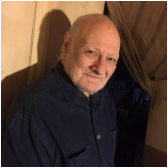 Stanley Kaplan has published poetry in a number of journals, including Onthebus, Midstream, Chiron Review, Ragazine, Mobius and Quiet Courage with others forthcoming. He lives in New York City where he paints as well as writes. He is the recipient of a Pollack- Krasner Foundation grant. His paintings can be seen on their web site, pkf.org THE ANXIOUS SUPPLICANT by Stanley Kaplan Defining corners, edges, still things disappear. The witness roustabout reorders the century, curating bones and basics. The stars fold and unfold. And the anxious supplicant is afraid of the dark. ROUNDELAY by Stanley Kaplan What provender is provided the routine spirit. The roundelay sung to the end of the sound is an atonal artifact. Wither the secluded man? The celebrated fan banging pots and pans, who jigs on Jay's show. When he ascended from the cellar, he wept publicly on Chanel Four. GIDDY SECONDS by Stanley Kaplan
I had no objection to sending the money, but requisitioning a formal demand! Spit on the devil and see where it gets you. I had no objective in mind, except to be ostentatiously kind. I had no mind. Increasingly the illness had set in. The giddy seconds. The lesson plan from the city of Cinabar said that it would take two years to reach the Sprightly Falls. Two years! We summarize a life. Who was that coffin I saw you with last night? That was no coffin that was the balm of gratitude.  COREY MESLER has published in numerous anthologies and journals including Poetry, Gargoyle, Five Points, Good Poems American Places, and Esquire/Narrative. He has published 8 novels, 4 short story collections, numerous chapbooks, and 5 full-length poetry collections. His latest novel, Memphis Movie, is from Soft Skull Press. He’s been nominated for the Pushcart many times, and 2 of his poems were chosen for Garrison Keillor’s Writer’s Almanac. With his wife he runs a bookstore in Memphis. He can be found at https://coreymesler.wordpress.com. As I Fall so Falls Niagara Falls by Corey Mesler “Something for us is pouring now more than Niagara pouring.” --Walt Whitman Born in Niagara Falls, American side, on the edge of two great countries: one vast, placid and cold, one mean, fiery, full of freedom and war lust. Which is most in me? Which blood is my blood? I only know that at night, when I look to the fathomless stars, I see black between black, light that is weak but penetrating, and I know that in me, there is falling; there is a roar, not unlike a river of blood, going over and over the edge. My head was turned by Corey Mesler My head was turned. I did not see the world change utterly. I took advantage of the e- clipse to picture you silvery and cold. Your eye was on the vapor trails of different planes. I walked out onto the highway, naked but for my cup, and asked the first speeding maniac for a lift. The kind I had in mind was per- manent, last and lasting, a real spooky ending. Simple Pleasures by Corey Mesler
There are simple pleasures the priests tell me as I make my way down the stony path to find the water, alive, laughing, and delicate. There are thorns also. This I learned from the beasts of the field. Their lessons are more severe and harder to decipher. I wait at the gate for you and, in my hand, are the flowers the field told me were the finest. Coming up the road, anticipating my face, I see you smile and I hold the flowers to my nose to welcome you like the wind. 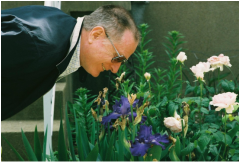 Donal Mahoney, a native of Chicago, lives in St. Louis, Missouri. He has worked as an editor for The Chicago Sun-Times, Loyola University Press and Washington University in St. Louis. His fiction and poetry have appeared in various publications, including The Wisconsin Review, The Kansas Quarterly, The South Carolina Review, The Christian Science Monitor, Commonweal, Guwahatian Magazine (India), The Galway Review (Ireland), Public Republic (Bulgaria), The Osprey Review (Wales), The Istanbul Literary Review (Turkey) and other magazines. Some of his work can be found at http://eyeonlifemag.com/the-poetry-locksmith/donal-mahoney-poet.html#sthash.OSYzpgmQ.dpbs (Photo: Carol Bales) THE HONEY ROOM by Donal Mahoney Brother Al, in his hood, is out in his field making love to his bees. From my room I can see him move through his hives the way people should move among people. The bees give him gold and the gold turns orange in the jars that he sells in a room near the door of the abbey. The Honey Room, everyone calls it. Besides Brother Al, only I go into that room full of honey. I go in there and bend and look through the jars on the shelves and the sills till there in the orange I see Sue standing straight in a field of her own with a smile for our garland of children. IN BREAK FORMATION by Donal Mahoney
The indications used to come like movie fighter planes in break formation, one by one, the perfect plummet, down and out. This time they’re slower. But after supper, when I hear her in the kitchen hum again, hum higher, higher, till my ears are numb, I remember how it was the last time: how she hummed to Aramaic peaks, flung supper plates across the kitchen till I brought her by the shoulders humming to the chair. I remember how the final days her eyelids, operating on their own, rose and fell, how she strolled among the children, winding tractors, hugging dolls, how finally I phoned and had them come again, how I walked behind them as they took her by the shoulders, house dress in the breeze, slowly down the walk and to the curbing, how I watched them bend her in the back seat of the squad again, how I watched them pull away and heard again the parliament of neighbors talking. 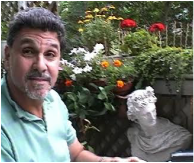 Gary Beck has spent most of his adult life as a theater director, and as an art dealer when he couldn’t make a living in theater. He has 11 published chapbooks. His poetry collections include: Days of Destruction (Skive Press), Expectations (Rogue Scholars Press). Dawn in Cities, Assault on Nature, Songs of a Clerk, Civilized Ways, Displays (Winter Goose Publishing). Perceptions, Fault Lines and Tremors will be published by Winter Goose Publishing. Conditioned Response (Nazar Look). Blossoms of Decay will be published by Nazar Look. Resonance will be published by Dreaming Big Press. His novels include: Extreme Change (Cogwheel Press) Acts of Defiance (Artema Press). Flawed Connections (Black Rose Writing). His short story collection, A Glimpse of Youth (Sweatshoppe Publications). His original plays and translations of Moliere, Aristophanes and Sophocles have been produced Off Broadway. His poetry, fiction and essays have appeared in hundreds of literary magazines. He currently lives in New York City. (Photo by Nancy Beck) TRANSITIONS by Gary Beck UNKNOWN FUTURE I do not fear that I will cease to be, having consumed enough fear in my anguished lifetime to drown my sensibilities in a flood of denials. So whatever comes next, nothingness, (beyond my comprehension except intellectually), some conception that may resemble other's speculations. Yet I can't visualize a meaningful afterlife, though it might be nice to be a kindly angel helping those in need, but there is too much rust in my troubled days for me to get wings. So my only hope is to finish earthly chores before departure. DISCARDED DREAMS Temporal pleasures are fleeting, yet while they occur more than compensate for endemic frustration of lofty ambitions fueled by animate desires, thwarted by reality, consigning expectations to the furnace of failure PERSIST
Between a birth and a death all our expectations are subject to winds of change. The paths we assume will bring a better life can only be realized if we escape disaster. War, plague, famine, flood, interject disruptions of daily continuation. So only survivors pick up the pieces of shattered tranquility, resume the struggle to endure coincidence, fate, destiny, act of ---, without surrendering to beckoning despair. 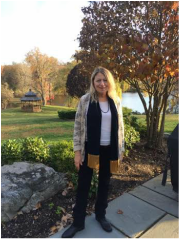 Thea Schiller, a Long Islander from New York, holds a B.A. in Creative Writing from The City University of New York, and an MS in counseling from Western Connecticut State University. For over two decades she spent her summers abroad in France with her late husband and daughter. She is the Orchard Prize winner for her poem, “Sarah" published in Furrow, University of Wisconsin, and has been published in other University literary presses. Currently, she lives in Westchester, practices psychotherapy in Connecticut and is writing her first novel. EXPERIENTIAL HOPE by Thea Schiller I am fancy constrained. The knotted love besotted gone. Exotic senses from my youth restrained. The long way back to return defies refined. The knotted love besotted gone. I dream cool nights can burn the bind. The long way back to return defies refined. I miss my youthful entanglements sine qua non. I dream cool nights can burn the bind. The beauty of our art fires, flees, and pleads. I miss my youthful entanglements sine qua non. Remembrance of our magic protects its ease. The beauty of our art fires, flees, and pleads, I am fancy constrained. Remembrance of our magic protects its ease, Exotic senses from my youth no longer restrained. MANNY by Thea Schiller
He is already on the cruise waiting for me with packed bags, wearing his blue felt sombrero we bought in Cancun five years ago. Toasting me with champagne by the rail, he says, “Darling take your walk, I know how you love the first snow fall.” I’m rushing, the taxi is late; I’m sweating. I can’t find my best bra to wear under the green moss dress he loved to touch. The telephone rings; it’s our daughter agonizing over the GRE’s, and I’m wishing he were here. I run away from her call, consumed in the absence of words to comfort. ‘And where the _______,’ (I almost curse) in case I want to write a poem. It’s 4:00 am and the cruise is departing, and I weep knowing I can’t transcend water and sky.  Harambee Grey-Sun: My poetry has appeared in a handful of literary journals, including CrossConnect, Epicenter, RiverSedge, the South Carolina Review, theSquaw Valley Review, and the Wisconsin Review. I am the author of Wine Songs, Vinegar Verses and Spring’s Fall (Autumn Numbers, Book I). I am also an alumnus of the Community of Writers at Squaw Valley. OUR SAVED AND SOVEREIGN EMPIRE by Harambee Grey-Sun All of us here mired in Heaven may safely shut our eyes, taking advantage of the unsuspecting quiet ones, spun out of the rare caring guardians’ orbit and into an immature satire of nature, an artless work intended to make a mess of the rotating stages. Children, kill your parents. Adults, don’t have kids. Poorly put, but moral taught. Boys and girls, even though heavily armed with double-edged grudges, will ease away from the extremes and settle in the muddle—the Fear of Love, chilled and instilled while they’re odd and young-- promising us Archangels unending evenings embracing the unchanging, faceless dark. DISPLACE. REMODIFY. By Harambee Grey-Sun
There are no homeless in the airport, only the bewildered and indignant with certain insecurities concerning time zones, destinations. The guttural cries of children, agonies of adults subjected to turbulent shifts in plans, our moaning cushioned with threats about what will happen when the unexpected happens yet again. We all may as well be dressed in sackcloth, faceless, carping prophets in a land untraced by divinities, made less and less as we jostle and shuffle through the gates down the tunnel with a dim, cramped cabin at its end. But we adapt to our new surroundings, distract what’s left of ourselves with wireless gadgets, against all stressed advice about ensuring safety. In reality, the devices we hold and the vices we swear we don’t all have tendrils digging in, entwining blood vessels and nerves, which tighten and jerk during taxi, then tremble upon the realization God is an adverb waiting for us. 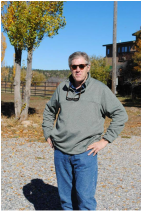 D.G. Geis divides his time between Houston and the Hill Country of Central Texas. He has an undergraduate degree in English Literature from the University of Houston and a graduate degree in philosophy from California State University. His poetry has appeared in 491 Magazine, Lost Coast, Blue Bonnet Review,The Broadkill Review and A Quiet Courage. He will be featured in a forthcoming Tupelo Press chapbook anthologizing 9 New Poets and is also winner of Blue Bonnet Review's Fall 2015 Poetry Contest. Dancing with the Stars by D.G. Geis For Jeffrey Levine There was that night you stood on the balcony and the stars counted you-- one of many squeaking things. that smallness serves on a skinned plate. Mr. Universe (an omnivore), did not have enough light to read the menu, so he made a flashlight from your rib, and after he cooked it, he swallowed the rest of you whole. Your skin he fashioned into a tattooed brick which he hurled through morning’s window. And left you standing in daylight’s slippers with morning’s coffee and a cigarette; as if nothing happened, as if you were invisible, as if the smoke curling around your fingers was the winter breath of a dazed runner or ash from a starry crematorium. Texas Eagle by D.G. Geis Between Mineola and Texarkana the mystery of trampolines in the backyards of the poor Outside St. Louis glass-eyed factories blinded by recession guided home by the kindness of power lines dieseled skank the Mississippi lifting her muddy skirt Near Alton Illinois palsied farm houses shaking circles of bony elm herefords in feedlots waddling through duvets of manure and snow skinned of corn detasseled fields scabbed with ice sun hung over retching behind a barn At the Springfield Amtrak Station the buttoned down Amishman sitting on a bench calmly peeling an orange with a spoon. On the Illinois River outside Havana brick streets red teeth rattling loose rusted cars hovering on blocks barges nudged by mothering tugs children shoving their way into a school bus the Ameren plant night cleansing aerosol plumes of lengthening smoke In Chicago under the El two vagabonds making out on a Hefty bag Wheel of Fortune on Econolodge lobby TV night sting of streetlights morning yolk unbroken dawn over easy When dead friends appear by D.G. Geis
When dead friends appear be kind enough to ask them in. They have traveled a long way and are doubtless tired. Be sure they have a comfortable place to sit and remember the laws of hospitality. Perhaps a cup of coffee or a carafe of wine. Inquire about their well being without being overly curious or intrusive. Trust their past with the same conviction you can trust your future. When they speak, listen carefully. Be considerate of those still sleeping. It has been said attention is the purest form of generosity and the only gift of the living to the dead. Never forget you will either be remembered or forgotten. Be thankful—be careful. There is nothing else. One day you will visit too.  Robin Wyatt Dunn writes and teaches in Los Angeles. burnt out over the edge an ember over the sun burning luminous-- thrust fill and 'scape the earth ash whirl round and out: find out what where and who for everything you are the little man pursues his dream behind his screen of death shifting many things beneath his robe the cope the dope the rope the soap the terrible burden of love all colors and all mysteries are pasty white behind his eyes the dry and life shred easily sighing their way with them: hear me describe hear me enliven hear me divide his head from the screen: here, boy, let me tell you: it was a bad idea, this little dream come out and in this sin is nothing special just provincial this landscape knows no god and no device it's alive and with a woman he stems out to find the rule the sooner tool bray mound and roll the earning of the luck and the sterning of the fool into a warrior no use but reuse in the long bowl of the depression and no winning but through terror each your own come in, and sit down and be ready for the mull of the engines we bring you now surround break mask and fail take here the better staff to beat her in the district cold cartoon and fled: break the lost last and lust for better better better be I die the right king underneath this singing  Charles Leggett is a professional actor based in Seattle, WA, USA. Recent publications include FRIGG Magazine, Graze, Latchkey Tales, Form Quarterly, Firewords (United Kingdom), Southword Journal (Munster Literature Centre, Cork City, Ireland), and Punchnel’s. Others include The Lyric and Measure: A Review of Formal Poetry; his long poem “Premature Tombeau for John Ashbery” is an e-chapbook in the Barnwood Press “Great Find” series LAYOVER: EMPRESS HOTEL by Charles Leggett outside Kuala Lumpur This building rises nakedly up from rows of yellow three-story flats like an elegant wart from the crown of a dentist’s hovering knuckle. Lurching half-hour’s drive from the airport; lobby and halls suffused in prayer chants piped in through a subtle P.A. system. “Help in Time of Need” leads off the Gideons’ list of “Suggested Readings” from the worn bible they’ve “Placed” —next, as it happens, to The Teachings of Buddha—in what I’ll call the drawer of need. Now, techno dance beats debouch from a stoop below, across the street, next door to Naeshan Trading, where men in t-shirts are hunched at card tables under a naked bulb’s margarine light. An equivocal phrase, “drawer of need”: drawn as a bath is drawn—immersion; or sketched, in lines of a face—mundane, sweet, straining to become familiar in a nakedness dressed to the nines. THE AGENCY by Charles Leggett Out here mumbling Poor Old Jason Bourne, his third installment warm still in the tray. Turns out he’d signed up for it after all; he’d plunked his dog tags down upon the table like hotel keys at check-out. Landlady’s stained, forsaken particle board stacked against the disused concrete planter, raindrops licking coldly at everything (two hours sitting on my ass inside’s not helping with the cold.)—but it’s the clouds of smoke that catch my eye. The hill’s tilt south down Franklin, freeway noise uncoiling, coiling; rocking back and forth on balls of chilly feet, not even sitting. Stealing the pleasure of smoke. The waters Poor Old Jason Bourne began these movies in were cleaner. They didn’t give Matt Damon time to act, much. His Bourne takes action, as if that were all the world had left to offer him. Damon simply has to be precise, to be himself the narrative. They put that Poor Old Jason Bourne up on a rooftop at the movie’s end, allowing the breathless agent who has somehow managed to corner him the choice of…well, of not shooting him right away. Bourne’s had his brief and flashback-ripe reunion with Albert Finney’s basso spymaster: a version of Polonius stripped bare without the foibles or loquaciousness —albeit the pomposity remains. (Polonius occurs because my mother reminded me of him, three decades past, advising me about my parentage.) He doesn’t even have panache enough to die, this humorless, this dry, on-task, hermetic, old Polonius, his droll pronouncements not a bit less obvious for all their rumbling portent. A spat of editorializing, then, up on the rooftop, as to what’s been asked of these two men by their superiors throughout the years; then Poor Old Jason Bourne (or whatever name does manage to be his) jumps off into the river. I still can hear in the tenor of her voice, and see by angles that her face described, the grace that conversation long ago had asked of her. That it would be all right, if I did want to know. That I was free to seek the persons out. Her tenderness, in saying that their feelings, hers and Dad’s, were not what mattered—not against the weight of that inquiry into a frightened woman (likely younger, giving birth, than I was when my mother spoke to me) who carried me nine months and would have given me a different name. STORY I TOLD MY MOTHER ON HER DEATH BED
by Charles Leggett “What happened?” comes a child’s voice ringing pure From out among the patrons. All can hear. And I am Prospero (a summer tour Of parks), with beard and scepter, arms both flailing From out a caftan, stormily regaling My daughter with the tale of being thrown From power to this “full poor” life she’s known. And there’s a little present Shakespeare’s left, A shortened line of verse, to catch one’s breath-- “What happened?” comes the child’s voice ringing then. “What happened?” comes the same voice ringing when Not ninety minutes later—all forgiven, At revels’ end—falls one last grateful silence: My daughter wending toward the changing tents With old Alonso’s son. And I imagine How all upon that island—“salvage,” human Or sprite; betrothed, bewildered (or a touch Besotted)—at the end could say as much: No longer captive, soon “reliev’d by prayer,” What happened ringing through the solemn air. I told my mother so, not two weeks later. Could say as much. And could not say it better. —Wooden O Free Shakespeare in the Parks, Seattle, WA, August 2001 |
Categories
All
|
 RSS Feed
RSS Feed